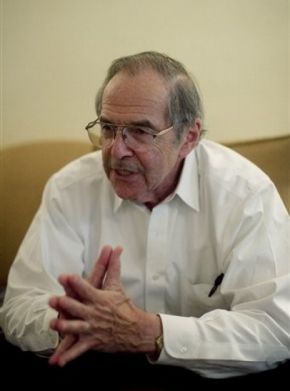US’s Lyman urges Sudan to accept African map for security arrangements
August 22, 2012 (WASHINGTON) – US president special envoy urged Sudan to accept a map drawn up by the African Union (AU) to establish a buffer zone on the common border with South Sudan in order to move forwards oil exportation and resolution of remaining issues relating to South Sudan’s independence last year.

“Once that is accepted, we can move ahead on the other elements of demilitarization. (…). And Khartoum must come around to accepting the map,” said Lyman in statements reported by VOA on Wednesday.
Sudan keeps refusing the proposed map saying that the mediation team imposed it without taking into account the reservation Khartoum had expressed it also fears that accepting this map might serve as an antecedent against Khartoum if the issue is brought before an international court in the future.
The African Union Peace and Security Council and the UN Security Council followed the conclusions of the mediation and stated that the purpose of this map is only to demarcate a “temporary security line” which will not prejudice the final status of the disputed border areas that will be tackled separately the parties.
Lyman also stressed that Sudan should accelerate the implementation of the humanitarian access to the rebel areas in South Kordofan and Blue Nile, in accordance to an agreement signed with tripartite initiative parties.
Khartoum is delaying the implementation of the agreement considering that the rebel Sudan People’s Liberation Movement–North (SPLM-N) may use a one-month ceasefire agreement it signed to reinforce its positions. Sudan, therefore wants this deal be renegotiated to prevent the rebels from instigating any such plans during this period..
The American envoy for the two countries underlined that the implementation of the security arrangements and the resumption of oil production will give them the needed time to reach a negotiated agreements on the other pending issues.
“So when you put that all together, I would say production won’t start for at least several months, and revenue probably won’t be significant until early 2013,” Lyman said.
OIL IN DECEMBER
In statements made in Juba on Tuesday, South Sudanese deputy finance minister Marial Awou Yol said the oil production will resume in December if the parties sign an agreement on security arrangements during the upcoming round of talks.
He further said they will start with exportation of Dar Blend oil produced in the Upper Nile state while the production of Nile Blend oil will resume before June 2013.
The Nile crude which is represents 20% of the South Sudanese production is sold at higher price than Dar crude which is very heavy and paraffinic.
Earlier this month South Sudan’s top negotiator Pagan Amum said the oil production might resume in September.
SECURITY COUNCIL PRESIDENTIAL STATEMENT
The UN Security Council will discuss this Thursday in a regular bimonthly consultations the progress of the AU mediated process in Addis Ababa. The meeting is also expected to hold further discussions on a draft presidential statement on the issue circulating since last its meeting of 9 August.
The draft statement regrets the failure of the two countries to meet the deadline of 2 August that the Council imposed in its resolution 2046.
However, the presidential communiqué is delayed by divergences between the Council’s members over how to describe Sudan’s refusal of the AU map for the demilitarised zone. Some favour tough language against Sudan but others refuse it.
Also the Security Council members are divided in their appreciation of the position of SPLM-North rebels in the process.
While they agree that the rebel group has to resume the political track of talks without preconditions, some suggest that the call for negotiations without preconditions should be addressed to the two parties, not to the rebel group alone. But such position is seen as excessive by other members, saying Khartoum accepted to negotiate under the resolution 2046 without condition.
The SPLM-N rebels demand a comprehensive process including the Darfur issue and ask to reinstate its chairman Malik Agar, the former governor of Blue Nile state, to the position his was deposed from a year ago, before to resume peace talks.
(ST)
